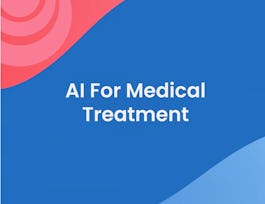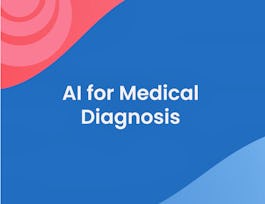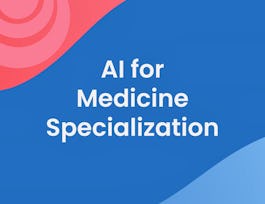AI is transforming the practice of medicine. It’s helping doctors diagnose patients more accurately, make predictions about patients’ future health, and recommend better treatments. This Specialization will give you practical experience in applying machine learning to concrete problems in medicine.

AI for Medical Prognosis
This course is part of AI for Medicine Specialization
Taught in English
Some content may not be translated



Instructors: Pranav Rajpurkar
26,611 already enrolled
Course
(758 reviews)
97%
Recommended experience
What you'll learn
Walk through examples of prognostic tasks
Apply tree-based models to estimate patient survival rates
Navigate practical challenges in medicine like missing data
Details to know

Add to your LinkedIn profile
4 quizzes
Course
(758 reviews)
97%
Recommended experience
See how employees at top companies are mastering in-demand skills

Build your subject-matter expertise
- Learn new concepts from industry experts
- Gain a foundational understanding of a subject or tool
- Develop job-relevant skills with hands-on projects
- Earn a shareable career certificate


Earn a career certificate
Add this credential to your LinkedIn profile, resume, or CV
Share it on social media and in your performance review

There are 4 modules in this course
Build a linear prognostic model using logistic regression, then evaluate the model by calculating the concordance index. Finally, improve the model by adding feature interactions.
What's included
11 videos3 readings1 quiz1 programming assignment4 ungraded labs
Tune decision tree and random forest models to predict the risk of a disease. Evaluate the model performance using the c-index. Identify missing data and how it may alter the data distribution, then use imputation to fill in missing data, in order to improve model performance.
What's included
15 videos1 quiz1 programming assignment3 ungraded labs
This week, you will work with data where the time that a disease occurs is a variable. Instead of predicting just the 10-year risk of a disease, you will build more flexible models that can predict the 5 year, 7 year, or 10 year risk.
What's included
16 videos1 quiz1 programming assignment2 ungraded labs
This week, you will fit a linear model, and a tree-based risk model on survival data, to customize a risk score for each patient, based on their health profile. The risk score represents the patient’s relative risk of getting a particular disease. You will then evaluate each model’s performance by implementing and using a concordance index that incorporates time to event and censored data.
What's included
24 videos4 readings1 quiz1 programming assignment3 ungraded labs
Instructors

Offered by
Recommended if you're interested in Machine Learning

DeepLearning.AI

DeepLearning.AI

DeepLearning.AI
Why people choose Coursera for their career




Learner reviews
Showing 3 of 758
758 reviews
- 5 stars
78.89%
- 4 stars
15.83%
- 3 stars
3.16%
- 2 stars
1.45%
- 1 star
0.65%
New to Machine Learning? Start here.

Open new doors with Coursera Plus
Unlimited access to 7,000+ world-class courses, hands-on projects, and job-ready certificate programs - all included in your subscription
Advance your career with an online degree
Earn a degree from world-class universities - 100% online
Join over 3,400 global companies that choose Coursera for Business
Upskill your employees to excel in the digital economy
Frequently asked questions
Access to lectures and assignments depends on your type of enrollment. If you take a course in audit mode, you will be able to see most course materials for free. To access graded assignments and to earn a Certificate, you will need to purchase the Certificate experience, during or after your audit. If you don't see the audit option:
The course may not offer an audit option. You can try a Free Trial instead, or apply for Financial Aid.
The course may offer 'Full Course, No Certificate' instead. This option lets you see all course materials, submit required assessments, and get a final grade. This also means that you will not be able to purchase a Certificate experience.
When you enroll in the course, you get access to all of the courses in the Specialization, and you earn a certificate when you complete the work. Your electronic Certificate will be added to your Accomplishments page - from there, you can print your Certificate or add it to your LinkedIn profile. If you only want to read and view the course content, you can audit the course for free.
If you subscribed, you get a 7-day free trial during which you can cancel at no penalty. After that, we don’t give refunds, but you can cancel your subscription at any time. See our full refund policy.
